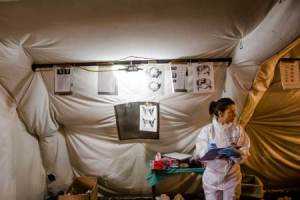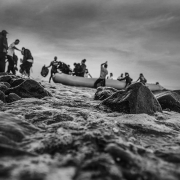Migrant bodies
Published by Emuse, the book Corpi migranti (Migrant bodies) by Max Hirzel, with textual contributions by Dagmawi Yimer (director), Grazia Dell’Oro (editor), Federico Faloppa (professor of History of the Italian language and Sociolinguistics at the University of Reading) and Pietro Del Soldà (journalist and writer): https://emusebooks.com/libri/corpimigranti/
I met Alpha in Bamako, in 2011. The idea to work on the management of migrant deceased bodies originated that day, with his words.
I began from the cemeteries, I wanted to understand where and how those bodies are buried, how many are identified and how many not. I noticed many similarities between the reception of migrant people survivors and the management of migrant’s corpses: codes, lines, numbers, suits, masks. In both cases, the individual histories bring us to the person.
These bodies, as quantity and age of the victims, represent an anomaly, a huge aberration that can be mistaken for fatality. I wanted to show this anomaly. One corpse, one person. A number instead of the name. I was getting closer to the heart of the matter, the identification. In one side of the Mediterranean sea there are people working for returning a name to a body. In the other one the missing families that without that body cannot celebrate the mourning.



I met many stories, as those of Angelo Milazzo, policeman of Syracuse Attorney, and Mohamed Matok, Syrian lawyer, that leaved Damascus especially to visit the grave of his brother, identified by Angelo. Then the story of the so-called “boat of innocents” – which sank on April 18th 2015, with the loss of more than 700 lives – that intersects with the work of Cristina Cattaneo, director of Labanof (Forensic Anthropology Laboratory of Milan University), and with the young autopsy technicians of the Palermo Policlinic.
Finally, in south Senegal, I met the family of Mamadou, missing for two years, he’s an alleged victim of this same shipwreck of April 18th 2015. “They face an impossible mourning”, explains Miriam Orteiza, International Red Cross psychologist, “They need to have evidence to accept death, to be able to process mourning, they must have a body”.
“Migrant bodies” is today a book, published by Emuse in 2021, available at emuse books.com




